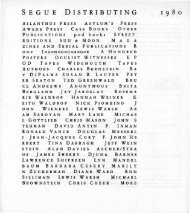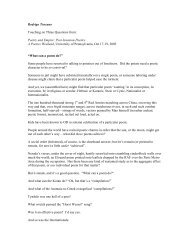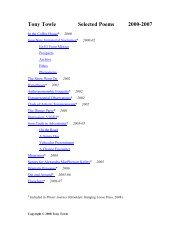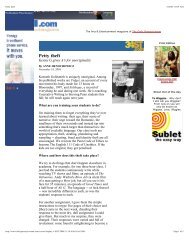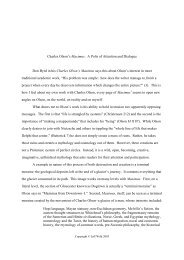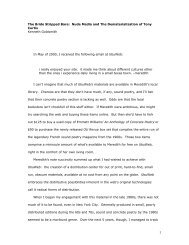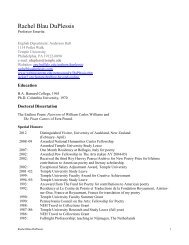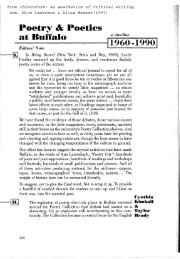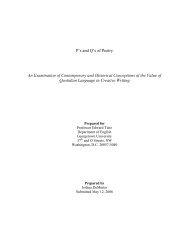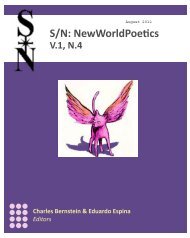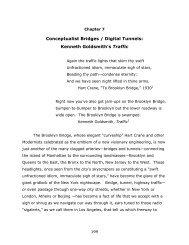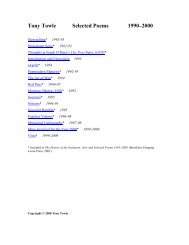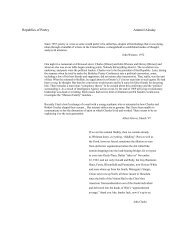Preface - Electronic Poetry Center
Preface - Electronic Poetry Center
Preface - Electronic Poetry Center
Create successful ePaper yourself
Turn your PDF publications into a flip-book with our unique Google optimized e-Paper software.
From: Mark McMorris<br />
Subject: Re: bland abstract lyrics<br />
Yet another act of delurking (=lug rude kin):<br />
1) Bland of course is in the eye of the beholder, but I suppose one means poetry<br />
that is monotonous, unmodulated and unaccented, clever rather than perceptive,<br />
perceptive rather than selective, meandering rather than directed, vague,<br />
hubristic, histrionic, picture-postcard dull–in short, metrically and procedurally<br />
commonplace. A few queries: is the abstract bland? Can there be a non-bland<br />
abstract (there can be a non-abstract bland, as we know)? By abstract are we to<br />
understand a bad case of conceptual manipulation a la late Stevens (without his<br />
ear or eye–or brain, for that matter)? Is "The Triumph of Life" bland? Abstract?<br />
(Yes on both?) Is Stein’s Tender Buttons abstract (I assume it’s not bland)? Is<br />
Césaire’s Ferraments abstract? (No) Is it conceptual? (Yes) Lisible? (no)<br />
Scriptible? (yes) Moving?<br />
2) I know that procedural ingenuity or formal obliquity has produced most of<br />
the interesting (to me) poetry in the US in the last 50 years, but if I am to make<br />
any sense at all, I must also say that the very same poets who opened up and<br />
kept open the still lively and living (a pesky romantic metaphor) forms of<br />
poetry around today themselves could be world-class bores. Being dull seems<br />
to be an occupational hazard of innovative writers–am I quoting here?–who<br />
venture into areas to invent them and on happy occasions (e.g, "A"-12, Prelude)<br />
are able release poetry, on other occasions (e.g., "A"-12, Prelude) fail miserably<br />
to make anything happen that hasn’t already happened elsewhere to greater<br />
effect (in conversations with Celia or Paul, for instance, to which I am not<br />
privy). Who can read Paterson through without a shudder of dismay? Williams<br />
and Zukofsky were onto something that became important for US poetry in the<br />
years after them and one might well tolerate the bland in "A"-12 in order to<br />
arrive at the sense of design in small matters as well as in large that Zukofsky<br />
undoubtedly (to me) managed to build in. What does this have to do with poets<br />
writing now? I suppose I’m trying sneakily to suggest that in a survey of any<br />
today one must expect a certain amount of the bland, but that it would be very<br />
unlikely if the Americas in 1995 were uniformly anything, let alone bland.<br />
Let’s say that an attention to syntax and decontextualized, rigorously antimimetic<br />
linguistic subversion/resistance characterized the underground now<br />
overground practice of the recent US avant-garde. Younger poets writing now,




